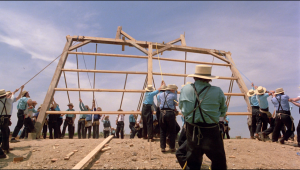
When my kids were small we watched a lot of Sesame Street. A lot. A co-worker who also had a small child and I would meet each morning to briefly determine what the Sesame Street ear worm for the day was, so that at least we weren’t cross-infecting each other with bouncy pedagologic songs. One of those sons was “Cooperation.” The lyrics were something like “Cooperation–makes it happen! Cooperation: working together.” A fine sentiment to teach four-year-olds. Or, as it more and more appears, 40-, 50- and 60-year-olds.
What is up with us as a country? With the crowd of people out there who rail against cooperating with the effort to get a handle on Covid-19 by wearing a mask, because (as I interpret it) “you’re not the boss of me?” Is this the logical endpoint of that American trope, the myth of Rugged Individualism? That trope, the oft-recycled stuff of stories and film, is a hell of a basis for fiction. Heroism! Determination! Perseverance! Grit! When I was a kid I found this deeply compelling (what child doesn’t believe, in her heart of hearts, that it’s her individualism against the dark forces of parents who want her to wear shoes?). But it seems to have gone way overboard, growing like kudzu, overgrowing that other, equally important value: cooperation. You don’t raise a barn by yourself: your neighbors come and help you raise your barn, and when they’ve got barns to raise you help them.
A nation needs neighbors, and a nation needs that interwoven net of shared responsibility and obligation that neighborship (for want of a better word) implies. Not just “I hold the door for you” or “I don’t take all the toilet paper off the shelves at the market”, but “I wear a mask so that any germs I’m carrying don’t infect you.” Some of my forebears were pioneers, the rugged individualists who kept moving across the country looking for a place to settle and build (we will leave aside, for the moment, the question of the people who were already living in those places and had been for centuries before). I can find no documentary evidence of it, but I suspect that they did help their neighbors (see You Don’t Raise a Barn By Yourself) because that’s what was necessary, and those folks were nothing if not practical.
I have a long-standing distaste for the Transcendentalists, whose belief in the virtue of the individual and the corrupting influence of society was often supported by the effort and money of others. Bronson Alcott, who had some legitimately brilliant ideas about education, was content to be a sage and live off handouts from friends and family, and his wife’s wages, because his brilliance required support (okay, I’m paraphrasing here, and I have a particular dislike of Alcott for reasons, but that’s the gist of it). Would Emerson have worn a mask? Would Thoreau? If the action of an individual could assist society, would they feel that they had an obligation to take that action? I suspect so, because they were also very big on individual responsibility. And maybe that’s the problem. There is a core of people who want the right to do what they want, without the responsibility that living among others, among neighbors, requires. And that’s at least part of what has gotten us into our current pre-apocalyptic situation, in my opinion.
I admire grit and perseverance and determination, qualities that make it possible to write a novel, build a country, raise a child, or grow a tomato. As an adult, I also admire kindness and generosity, and most of all, co-operation. Which, as the Muppets point out, makes it happen.
